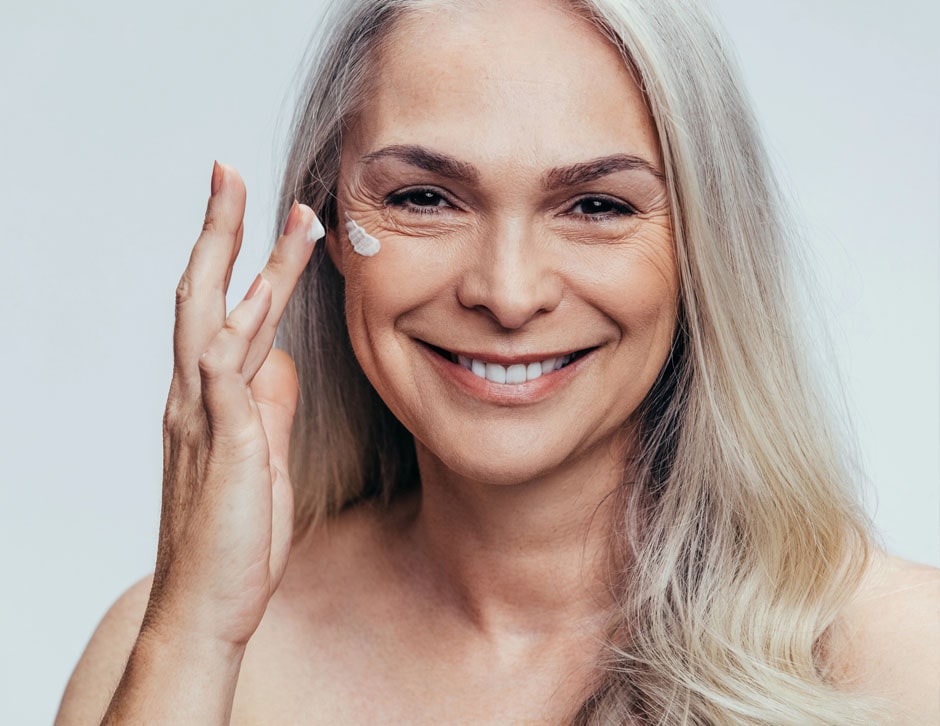
As we age, our skin goes through a shift. Our largest organ responds differently to skincare products, adapts to seasonal changes and is particularly sensitive to the sun (read: skin cancer, premature aging). Add to that the everyday stresses and environmental factors we all encounter, and skin has a full load to deal with. And though researchers say genes can play a role in how you might look at 40, 70 or even 90, there’s a slew you can do on your own to increase long term facial vibrancy and vitality. It’s essential to incorporate these steps now to maintain skin longevity.
- Don’t Smoke & Curb the Alcohol
The Centers for Disease Control estimates that an astounding 39.1 million adults in the U.S. smoke. Tobacco smoke pollutes your lungs and the air around you AND it does serious long term damage to your skin. According to the FDA, the thousands of chemicals and by-products in cigarettes destroy collagen and elastin (the building blocks of healthy skin and cell turnover). Smoking causes sagging skin, wrinkles, dull complexion, age spots, clogged pores and even facial discoloration.
Alcohol is a similar culprit. It depletes your body of moisture and dehydrates your skin. Over time, this can lead to long term cell damage–which, yep, just makes facial skin appear older and more tired. How do you know how much is OK to drink? According to US Dietary Guidelines, drinking in moderation is the way to go. More specifically, up to 1 serving of alcohol per day for women and up to 2 servings per day for men. - Moisturize, Moisturize, Moisturize.
Your skin is losing moisture with each trip around the sun. That’s why the American Academy of Dermatology says it’s critical to apply a facial moisturizer every day. Moisturizer works by trapping water in the dermis and epidermis layers of skin, giving it a more youthful appearance. Moisturizers can have a multitude of effects, from firming and plumping (like AgelessRX’s DMAE Firming Gel), to boosting collagen or soothing sensitive skin.
Consult your dermatologist for more information and to find out what kind of moisturizer you should be using.
Pro tip: Harvard scientists say to look for ingredients like dimethicone, glycerin, mineral oil, or hyaluronic acid, which hold moisture in the skin. And, in colder weather, humidify. A drugstore humidifier used daily where you work or sleep will add moisture to the air and help rehydrate your skin. - Wear Sunscreen.
Skin cancer is the most common cancer in the U.S. According to the Surgeon General, more than 1 out of every 3 Americans will report getting a sunburn each year. Sunburn is a clear sign you’re not protecting your skin against the sun’s damaging rays–and a major cause of skin cancer. That’s reason enough to slap on the sunscreen. But, so are fine lines, wrinkles and other aging skin signs that occur after overexposure to the sun.
Experts say it’s important to apply two tablespoons worth of sunscreen thirty minutes before going outside. Use a sunscreen that is SPF 30 or higher and try to find one that’s considered “Broad Spectrum” meaning it blocks both UVA (causes aging skin) and UVB (causes sunburns) rays. Slather on more sunscreen every two hours. And, always reapply immediately after swimming or sweating. Don’t forget sunglasses, a hat and even sun-blocking clothing if you’ll be outdoors and without shade for a long time. - Easy Does It.
When it comes to your daily facial routine, experts agree “easy does it” is the best approach. Go with a gentle cleanser that’s free from strong fragrances and alcohol and won’t overdry your skin. When washing your face, use a gentle touch. Scrubbing will only irritate skin. If applying multiple products like eye gel or make-up, rub and blend in lightly. Trust your gut when it comes to facial products and stop using those that sting, burn or generally irritate your skin.
And steer clear of most exfoliators. It’s important to ask your dermatologist what’s appropriate for your skin type. Exfoliators or chemical facial peels and masks should never be used as a daily part of your facial routine since they can easily dry out your skin’s natural moisture barrier.
Pro tip: Try to keep your showers (or baths) short and sweet. A quick, five-minute shower will hydrate your skin. More than 10 minutes will start to dehydrate skin. Turn the temperature down as hot water can be harsh on skin. And, in the winter, when your skin is most susceptible to dryness, use soap lightly. - Keep Up a Healthy Lifestyle
Clinical studies suggest that eating a diet with plenty of fresh fruit, vegetables and other nutritional good-for-you foods may help prevent the damage that leads to premature skin aging. Similar studies suggest that diets full of sugar or refined carbohydrates can speed up the aging process. Think about it. Fruits and veggies contain antioxidants, the powerhouses that help restore your skin’s natural PH balance and kill off free radicals from pollution, stress and other environmental assailants. Omega-3s, in the form of fish, seeds and nuts, fight off inflammation and can help firm up your skin. For many more ways to sneak in nutrients and vitamins so your diet keeps your face healthy, check out these Cleveland Clinic tips.
Ever notice that post-workout “glow” you get after you hit the gym? Moving regularly promotes circulation and blood flow to your skin. This signals nutrients and oxygen to give collagen a boost and help skin cell turnover. When you sweat, you also rid your body of toxins that dull complexion and clog pores. The CDC also recommends a minimum of 150 minutes.